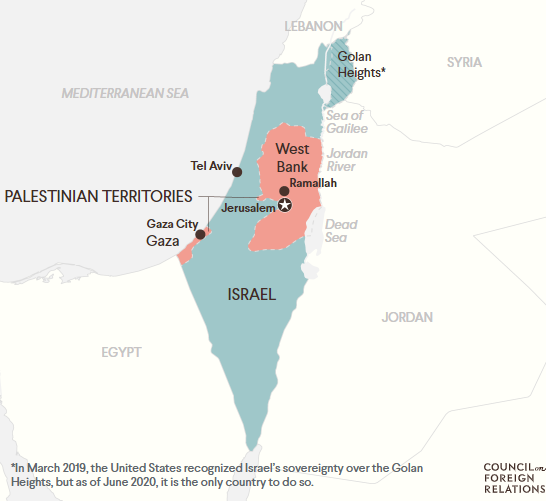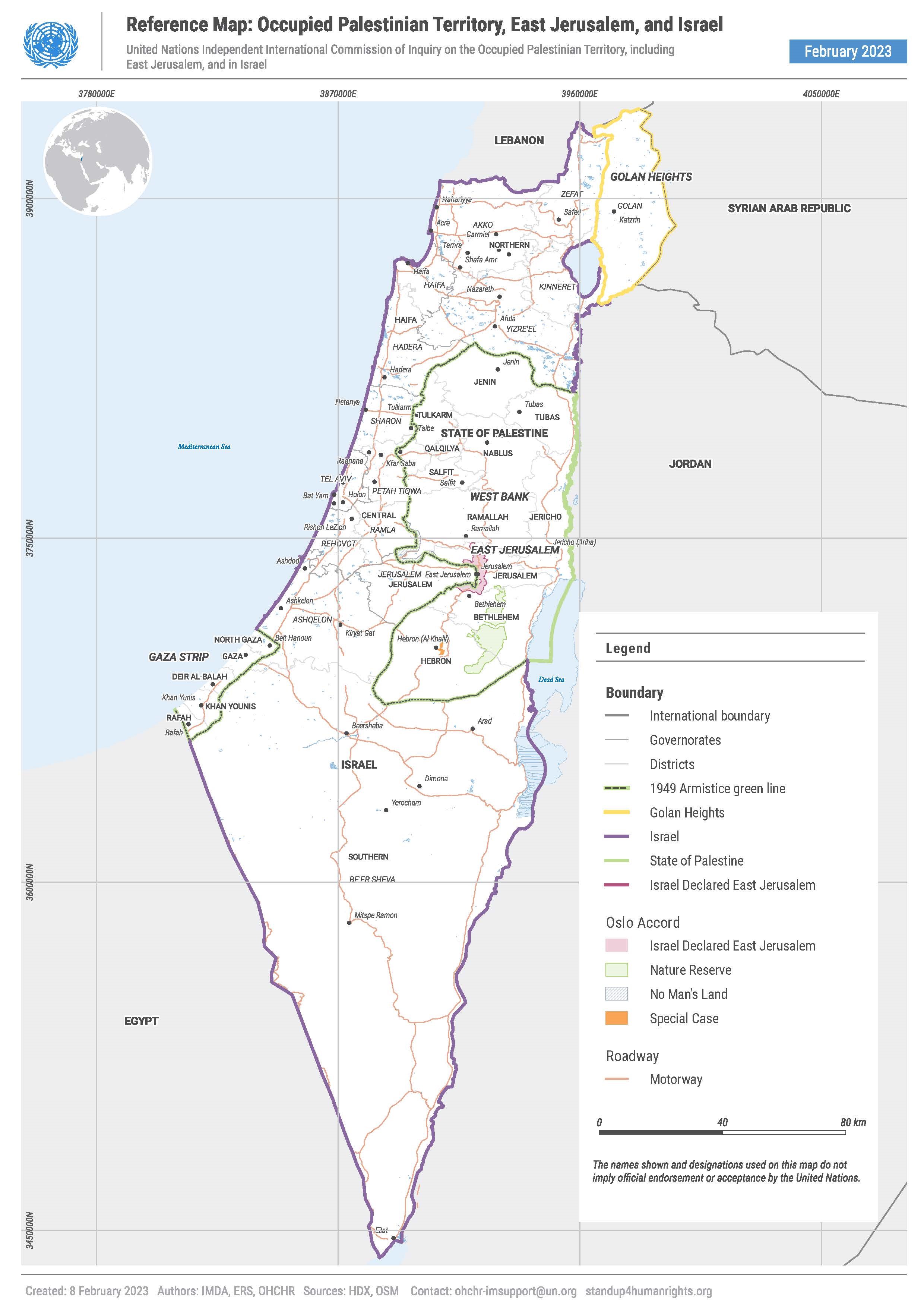On 8 August 2023, the Minister for Foreign Affairs, Penny Wong, noted in Parliament that ‘Australia is proposing to adopt or will be adopting or returning to the term “Occupied Palestinian Territories”’. This represents the latest move in the adoption of specific language to refer to the Palestinian Territories that has fluctuated in tune with the policy position of successive Australian governments. It is therefore timely to review what the Territories are, briefly outline the evolution of terminology used by Australia, and compare Australia’s approach to that of its peers.
What are the Palestinian Territories?

Source: Council on Foreign Relations

Source: United Nations Human Rights Council
The Palestinian Territories consist of the West Bank and Gaza. Israel occupied these territories during the 1967 Six-Day War. This brief conflict saw Israel conduct a pre-emptive attack on an Arab Coalition that transformed the Middle East. According to the Wilson Center, Israel gained territory 4 times its original size, transforming it from ‘a nation that perceived itself as fighting for survival into an occupier and regional powerhouse’.
However, Israel’s capture of the Sinai Peninsula, Gaza Strip, West Bank, Old City of Jerusalem, and Golan Heights further exacerbated Arab-Israeli enmity and the conflict between Israel and the Palestinians entered a new phase, creating hundreds of thousands of refugees and bringing over one million Palestinians in the occupied territories under Israeli control. Israel withdrew from Gaza in 2005, leading to some debate concerning its status. Organisations, such as the UN and Amnesty International, for example, still refers to Gaza as occupied, noting that Israel continues to enforce a blockade, while some commentators, such as Professor Gregory Rose of Wollongong University, point to the withdrawal to argue that Gaza is no longer occupied. It appears that Australia considers Gaza to be occupied, noting Senator Wong stated in Parliament that 'In adopting the term [occupied], we are clarifying that the West Bank, including East Jerusalem, and Gaza were occupied by Israel following the 1967 war and that the occupation continues.'
Israeli settlements in the OPT are widely considered to be illegal under international law, though this is disputed by Israel. According to the European Council on Foreign Relations (ECFR), ‘the West Bank is perforated by over 200 Israeli settlements, dozens of “outposts” and military bases, along with a network of restricted roads and checkpoints. In total, over 588,000 Israeli settlers reside in the OPT’. Further complicating the situation is the fact that Palestinian leadership is divided, with Hamas in control of Gaza and the Palestinian Authority based in the West Bank. As the ECFR puts it, this has resulted in:
…the emergence of two parallel systems of Palestinian governance, despite numerous intra-Palestinian reconciliation attempts. Gaza has also been under an Israeli air, sea, and land blockade since then, limiting the ability of Palestinians to travel and trade with the West Bank, and creating severe social, economic, and humanitarian hardships for Gazans.
Changing Australian terminology
The Parliamentary Library has published previously on issues relevant to this discussion. See, for example:
As indicated by the Foreign Minister, the Department of Foreign Affairs and Trade (DFAT) currently uses the term ‘Occupied Palestinian Territories’. The Guardian has reported that before this change was implemented, ‘ministers had broadly refrained from using the term “occupied” or “occupation”’ since 2014.
However, ministerial reluctance to use the adjective ‘occupied’ in relation to the Palestinian Territories appears to stretch back further. Foreign Minister Julie Bishop highlighted in June 2014 that the previous Labor Government’s foreign ministers referred to ‘East Jerusalem’, not ‘occupied East Jerusalem’. It also appears that those foreign ministers generally refrained from using ‘occupied’ when referring to the West Bank as well.
Labor leaders, such as prime ministers Julia Gillard and Kevin Rudd, also omitted the use of the word ‘occupied’. For example, in a media release condemning a bombing in Jerusalem, Prime Minister Gillard stated in March 2011:
The Government is deeply concerned by the recent escalation of violence in Israel and the Palestinian Territories, including rocket attacks on Southern Israel by militants in Gaza and the killing of civilians in Gaza, the West Bank and Jerusalem.
The term ‘Palestinian Territories’ has been used by both major political parties, with a survey of media releases demonstrating that senior Coalition government figures, such as prime ministers Scott Morrison and Malcolm Turnbull, and Foreign Minister Julie Bishop, used the phrase, but appear to have avoided adding the word ‘occupied’. For example, Foreign Minister Bishop, in a 2018 media release announcing that the Australian Government had discontinued funding to the World Bank’s Multi-Donor Trust Fund for the Palestinian Recovery and Development Program due to concerns that funds may be used to support acts of violence, stated:
The Australian Government remains committed to supporting vulnerable Palestinians with access to basic services, including health care, food, water, improved sanitation and shelter. We will now direct our $10 million allocation to the United Nations’ Humanitarian Fund for the Palestinian Territories which supports these services.
However, the Parliamentary Library has noted previously that shadow ministers and backbenchers, as opposed to ministers, are more likely to use ‘occupied’ when referring to the Palestinian Territories.
The last media release by a senior government figure to use the term ‘Occupied Palestinian Territories’ before the present controversy appears to be a 1998 announcement of Australian aid for Palestinian refugees issued by the Minister for Foreign Affairs, Alexander Downer, who stated:
The funds will be spent on training health workers, providing mobile clinics to visit refugee camps which receive no other support, coordinating sanitation, removing garbage, chlorinating water and, in addition, Australia has committed an additional $750,000 to continue humanitarian projects in the Occupied Palestinian Territories, which commenced last year.
This suggests that until recently there has been a significant degree of bipartisanship in terms of how Australian leaders refer to the Palestinian Territories.
How do peer nations currently refer to the OPT?
The US Department of State uses the term ‘Palestinian Territories’. The Jerusalem Post reported in April 2018 that the US Ambassador to Israel, David Friedman, had directed the State Department in December 2017 to stop using ‘occupied’ to describe the status of the territories. The newspaper also observed that the US State Department’s 2017 annual human rights report was the first since 1979 that did not refer to the Palestinian Territories as ‘occupied’.
The UK’s Foreign, Commonwealth & Development Office uses the term ‘Occupied Palestinian Territories’ in its most recent travel advice, last updated in July 2023.
In a March 2023 statement to the 52nd Session of the UN Human Rights Council, New Zealand’s representative used the term ‘Occupied Palestinian Territory’.
Canada’s policy on key issues in the Israeli-Palestinian conflict does not explicitly use the term ‘Occupied Palestinian Territories’. However, it states that it does not recognise permanent Israeli control over the West Bank, East Jerusalem and Gaza Strip, adding that:
… the Fourth Geneva Convention applies in the occupied territories and establishes Israel’s obligations as an occupying power, in particular with respect to the humane treatment of the inhabitants of the occupied territories. As referred to in UN Security Council Resolutions 446 and 465, Israeli settlements in the occupied territories are a violation of the Fourth Geneva Convention.
The European Union (EU) also uses the adjective ‘occupied’ to refer to the Palestinian Territories. For example, in a July 2023 media release published by the EU’s External Action Service (its diplomatic service) condemning tit-for-tat violence between Israelis and Palestinians, it stated that ‘The European Union is deeply concerned about the grave escalation in Israel and the occupied Palestinian territory’.